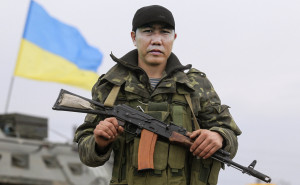
According to their opinion, the overthrow of Yanukovych by opposition forces parlayed worsening relations between Moscow and the West in exchange for trump cards. But the fire, swollen as it is, has covered different parts of Ukraine and the very same organizers were hit with the reverberation.
After the loss of the Crimea, the Ukrainian state faced the challenge of a long internal conflict and discord along ethno-linguistic lines.
Western policy to support of Kiev and against Moscow showed its short-sightedness, says Jordanian publicist, Michelle Al-Hajj. Its initiators hoped that Russia would cede accordingly and Europeans would win, in particular by opening avenues to the Ukrainian market. But instead of that, there is a lurking painful legacy; they now have to sponsor Ukraine in order for it to cover its fiscal deficit and huge debt payments. And that is added already to the credit problems in the economies of Greece, Cyprus and Spain.
Russian market is large, it imports a third of its requirements for goods from Europe. The Russian Federation is able to shift to other markets, particularly in the east and to the Pacific Rim.
In this context, media and social networks in the Middle East caused a resonance rise of Russian-Chinese relations, in particular the recent deal signed by Gazprom and China for 400 billion USD over 30 years, starting in 2018.
Indeed, there are contours of an energy bridge between the energy and the military giant, on the one hand, and its powerful financial and economic neighbor on the other. This is evidence that both countries continue to move towards the creation of a powerful political and economic pole with which the future world will need to consider.
The conflict around the Ukraine and the Asian course of U.S. President Obama highlight a common threat to Moscow and Beijing, and the signed gas agreement between the two is the backbone of long-lasting alliance to oppose the current U.S. hegemony, says Professor at Qatar University, Remy Payet. It is the author’s opinion, but it just may be the most important response to U.S. plans to isolate the Russian Federation and hinder the growth of its power.
Many commentators in the Arab region have responded to the prospect of the transition of Russia and China to mutual settlements in local currencies, bypassing the dollar. This news was received with enthusiasm as a sign of departing from intermediaries in economic relations and called for it to be emulated by other countries. It may herald the emergence of new growth markets, bearing the economic and political stability, and liberation from the domination of the U.S. monopolies, head of the NATO countries, writes the information network, Al-Talia.
The attitudes of Arabs to Russia in light of the events in Ukraine were highlighted by former Minister of Culture of the Palestine National Authority, Ibrahim Abrash, is largely due to their historical memory. It is in one way or another somehow connected with the perception of the U.S. as a force that for many years weaved its plots in order to amass for themselves great natural wealth while interfering in the affairs of sovereign states. In this regard, the Arabs continued to look with sympathy on Moscow as the successor of the USSR and a force to oppose the United States.
The media campaign launched by the world’s attempting to present the events in Ukraine as a revolution is not convincing. Most of the elite, intellectuals, and the streets in the Arab world see Ukrainian events in light of the shocks and adversity that they themselves had to endure since the beginning of the “Arab Spring” three years ago.
At the same time in the multimedia space we hear criticism of Russia’s policy in Ukraine. They mainly come from countries forces and irreconcilably opposed to power of President B. Assad in Syria, which Moscow supports.
Proponents of containment of Russia link its actions in the Crimea and Ukraine, trumpeting about the inadmissibility of interference in the affairs of others. “But those who encouraged and agreed with the invasion of Iraq in 2003 have no right to preach morals to others, including Russia,” says Iraqi political analyst, Ali al-Asdi.
Yuri Zinin is a Senior Research Fellow at MGIMO and a columnist for the online magazine “New Eastern Outlook”.
